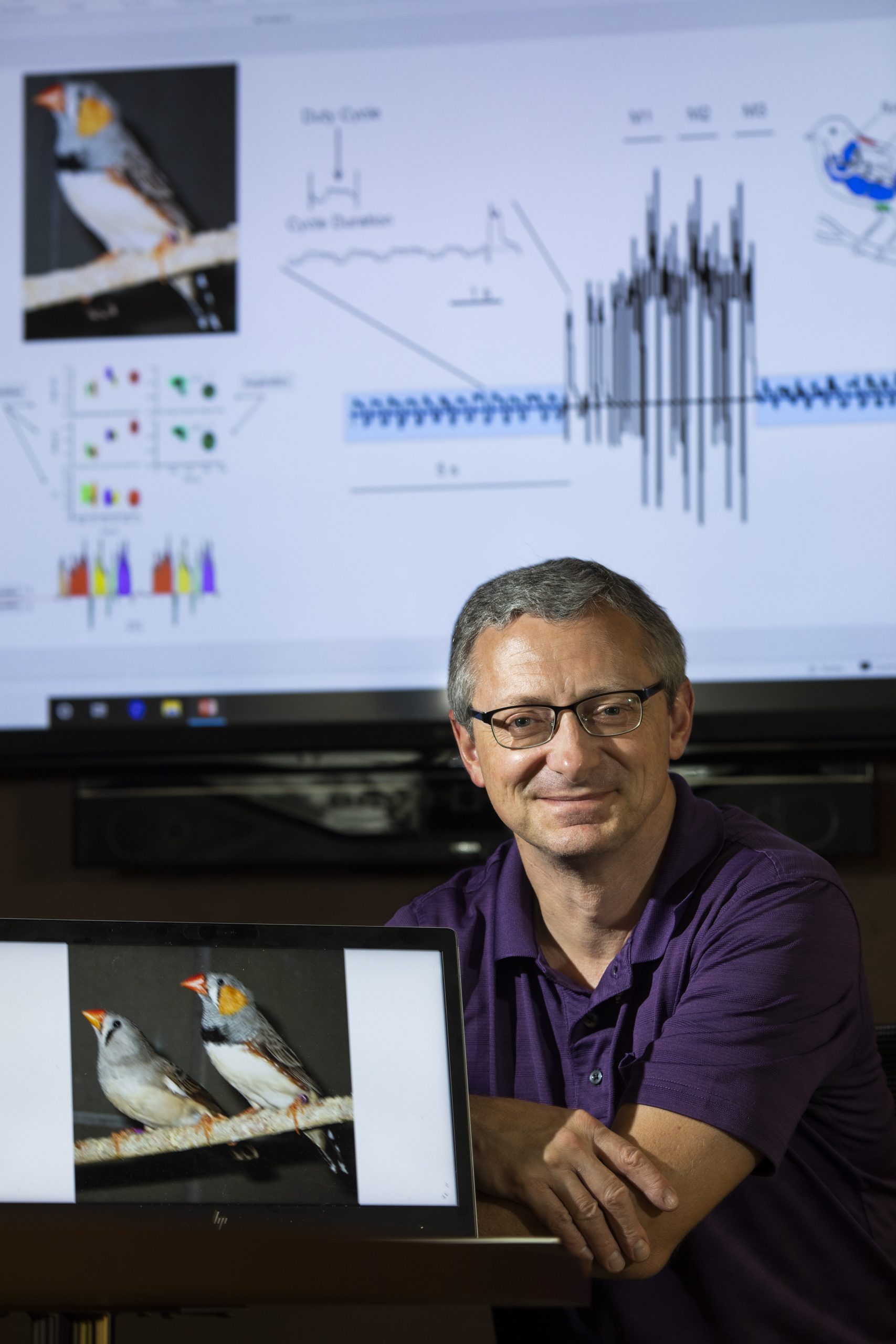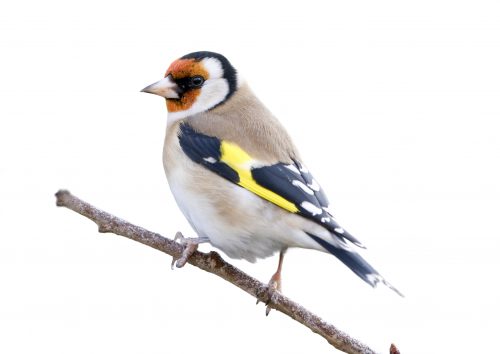How Birdsong May Help Stutterers
Brenton Cooper studies the brains of finches in hopes of improving language processing abilities in humans.

A grant from the National Institute of Health BRAIN initiative is helping Brenton Cooper study neural circuitry underlying the decision to vocalize. Photo by Rodger Mallison
How Birdsong May Help Stutterers
Brenton Cooper studies the brains of finches in hopes of improving language processing abilities in humans.
Just before an opera singer launches into an aria, she takes a deep breath. In that moment, beginning with the decision to sing, a cascade of signals occurs inside her brain. A similar flurry of activity happens in a songbird’s brain.
Brenton Cooper, associate professor of psychology, studies the physical and neurological events that occur when a songbird sings. His work gives insight into how the human brain and body prepare to make sounds.
To predict if a bird — or a human — is about to sing, measure the respirations, he said. “One of the things I look at is the respiratory patterns — the breathing patterns — of birds before and during song.”
Birds breathe differently from humans. Avian species have interconnected air sacs encasing the lungs that fill with air as they breathe. Because these sacs are accessible from outside the body, Cooper can use a pressure monitor to know when a bird takes a deep breath.
Cooper combined his studies on the physical respiratory patterns of zebra finches with the neurological observations of Todd Roberts, an associate professor of neuroscience at UT Southwestern Medical Center in Dallas. Roberts had identified neurons in a finch’s premotor cortex that are active just before it begins a song.
“We learn English from parents, and that initial auditory experience formed templates that you mimicked and imitated to develop language skills. Songbirds do the same thing.”
Brenton Cooper
“Dr. Cooper and I had been looking for an opportunity to work together for some time because both of our laboratories are interested in how vocalizations are controlled,” Roberts said.
Together they received a grant from the National Institutes of Health’s BRAIN Initiative to study how events inside the premotor cortex correspond to physical indicators of a zebra finch’s impending song. The hope is that by illuminating how the finch’s brain signals the body to sing, they can help scientists understand how the human brain initiates speech.
In the 1950s, scientists studied how songbirds learn their distinctive melodies. Findings showed that young birds learn by repeating what they hear. Birds taken from their parents and placed with birds who sing another tune will learn the song of the adoptive parent rather than the biological parent’s.
Humans also have a window of development during which they learn how to communicate, Cooper said. “We learn English from parents, and that initial auditory experience formed templates that you mimicked and imitated to develop language skills. Songbirds do the same thing.”
The key part of the bird brain in Cooper and Roberts’ research is the HVC, a neurological transit tunnel between the area of the brain activated when learning a song and the area that fires during singing. Roberts found that five seconds before a bird decides to sing, neurons in the HVC are active, suggesting it is helping the body prepare to burst into song.
Humans have a brain pathway controlling language that is similar to songbirds’ motor control of song production. Some neurologists theorize that this pathway is associated with Broca’s area, where defects can cause stuttering and other speech disorders. Cooper and Roberts are interested in learning how these neural networks change from a resting state to a vocalizing state. In doing so, they can draw parallels to how birds initiate song and humans prepare to speak.

Brenton Cooper studies the brain processes of songbirds. ANDREW_HOWE | E+ | Getty Images
Their research has applications for children experiencing delays in developing language skills and those who struggle with speaking. “Let’s take vocal fluency disorder, like stuttering in humans,” Cooper said. “One of the characteristics is an inability to initiate speech.”
If he can figure out the mechanisms of initiating speech, he can better understand what causes a person to stammer or otherwise stumble when attempting to talk.
A goal of the grant project is to learn how to control when the bird starts and stops singing using a technique called optogenetics, which tricks cells into being sensitive to a particular wavelength of light. He can then turn neurons on or off just by flashing a specific color of light.
Cooper said he hopes their research can help scientists develop treatments for children struggling with fluency disorders and adults trying to regain speech after a stroke or learning a second language. “If you really understand how the nervous system produces the behavior, then you should be able to systematically manipulate it and change it.”

Your comments are welcome
Comments
Related reading:
Research + Discovery
Understanding Literacy in Kids with Cochlear Implants
Even with hearing corrected, children may lag behind in language or reading comprehension.
Research + Discovery
Using Art to Treat Illness and Trauma
Amanda Allison and her students at TCU earned acclaim for designing therapeutic art programs.
Research + Discovery
What Does Dementia Feel Like?
Michelle Kimzey places empathy at the front of the nursing classroom to improve dementia care.